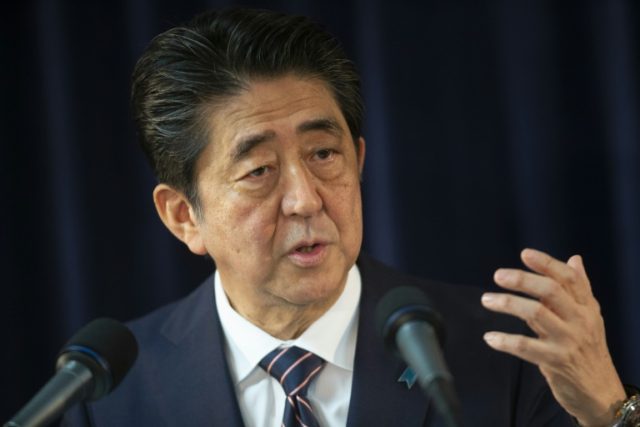Japanese Prime Minister Shinzo Abe is reportedly considering his own summit meeting with North Korean dictator Kim Jong-un following Kim’s Singapore summit with U.S. President Donald Trump.
The Wall Street Journal cited Japanese media reports on Thursday indicating the Abe-Kim meeting could be held as early as August, although there has been no official announcement yet.
Abe met on Thursday with the relatives of Japanese citizens abducted by North Korea in the 70s and 80s and promised he would “make progress on the abduction issue in any summit meeting with North Korea.”
Abe has previously indicated satisfaction with President Trump’s handling of the issue during his meeting with Kim, but there was no official announcement of progress and the abductees were not mentioned in the joint declaration by Trump and Kim.
As the WSJ recalls, Abe met with the previous North Korean dictator, Kim Jong-il, in 2002 as part of then-Prime Minister Junichiro Koizumi’s entourage. Kim Jong-il admitted North Korea kidnapped Japanese citizens to use them for espionage purposes, returned five surviving abductees, and insisted the others were dead.
Japan has challenged that contention ever since, and also charged North Korea with kidnapping more Japanese than Kim Jong-il admitted to. Japan also doubts Kim’s contention that rogue actors perpetrated the kidnappings without the approval of his regime.
Experts who have studied the issue believe the North Korean government abducted the victims to help train spies who would be sent to infiltrate Japan. At least one North Korean terrorist operative, taken into custody after bombing an airplane and killing 115 people in 1987, claims to have been personally trained by one of the Japanese abductees.
The most famed abductee in Japan is Megumi Yokota, who was kidnapped from a coastal town in 1977 when she was just 13 years old. Japan has disputed North Korea’s claim that Yokota committed suicide in 1997 after decades of captivity. DNA testing proved that remains returned to Japan in 2004 did not belong to Megumi Yokota as Pyongyang claimed. President Trump mentioned Yokota in his September 2017 address to the United Nations, describing her as a “sweet 13-year-old Japanese girl” who was enslaved as a “language tutor for North Korea’s spies.”
Japan has a very large chip to put on the table during negotiations: a massive reparations package for Japan’s occupation of the Korean peninsula during the first half of the 20th Century. North Korea has demanded reparations from the “Japanese imperialists” for many years. A reparations deal was on the table during Prime Minister Koizumi’s 2002 trip to Pyongyang, but it collapsed in part due to the abductee issue.
Prime Minister Abe might not like the domestic political ramifications of agreeing to reparations now, and it would also be very difficult to maintain the pressure of sanctions on North Korea if any such arrangement was made, but it seems almost inevitable that Kim will repeat the demand if he meets with Abe.
Japan Today anticipates Abe “will likely tell Kim that Japan is ready to move beyond the countries’ ‘unfortunate past,’ normalize bilateral ties and provide economic support after the comprehensive resolution of outstanding issues including North Korea’s nuclear and missile programs, and the abductions.” Abe will need to brace himself for whatever Kim Jong-un claims is necessary to move beyond the unfortunate past and be ready with counter-proposals.
Japan Today also notes that a group of Japanese abductee families advised Abe not to rush into a summit meeting with Kim, judging it “early for the prime minister to go and negotiate various matters while nothing is decided.”
Japan, of course, has security concerns to address with North Korea beyond the abductees. The Kim regime’s last few provocative ballistic missile tests delivered their provocations by flying through Japanese airspace, prompting Japan to hold civilian missile attack safety drills for the first time.
The Japanese have expressed concern about President Trump’s proposal to halt U.S.-South Korea military drills. Abe’s administration has emphasized the importance of those exercises in preserving the security of the entire region, presumably because a number of bad actors beyond North Korea’s borders are treated to an intimidating display of how quickly and effectively the U.S. military can project power across eastern Asia.
“Frankly speaking, I’m stunned. This is going to affect Japan’s security significantly. We must confirm his intentions,” said Japanese Senior Vice Foreign Minister Masahisa Sato after Trump said the wargames would be suspended.
Kyodo News on Wednesday quoted a Defense Ministry source who grumbled, “The unpredictable Mr. Trump has created a stir on a matter we had not expected.” The same report quoted a senior U.S. military official who said military exercises might be relocated to Japan from South Korea rather than canceled outright, particularly those involving long-range nuclear bombers.

COMMENTS
Please let us know if you're having issues with commenting.